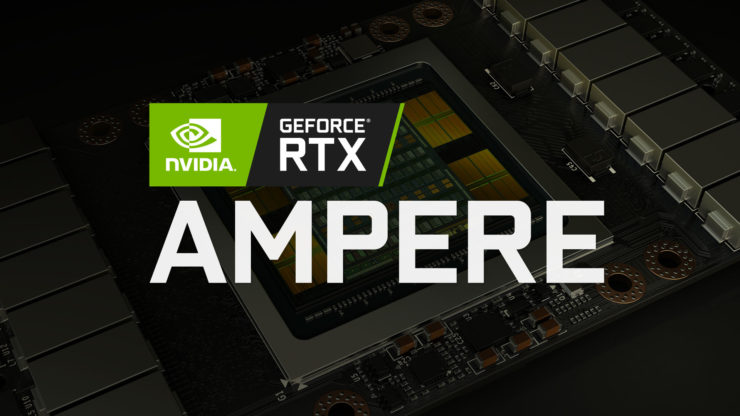
According to NVIDIA CFO Colette Kress, the company is experiencing supply constraints which make them unable to meet demand through Q4 2020 (Tom’s Hardware via Videocardz). This not only includes wafers and silicon but also substrate and components. This means that gamers will not be able to buy anything at affordable rates throughout 2020 and likely through the first quarter of 2021.
NVIDIA: RTX 30 Series Is Supply Constrained
Considering global efforts to distribute the COVID vaccine will start in 2021, it is also possible that global shipments will be disrupted even further as the vast bulk of vaccines is moved which would mean that gamers might not see prices normalize until late 2021. Of course, this also does not include the effect of cryptocurrency mining as ETH has already breached the $600 mark and mining is profitable once more.
“We do have supply constraints and our supply constraints do expand past what we are seeing in terms of wafers and silicon, but yes some constrains are in substrates and components,” said Colette Kress, CFO of Nvidia, at Credit Suisse 24th Annual Technology Conference. “We continue to work during the quarter on our supply and we believe though that demand will probably exceed supply in Q4 for overall gaming.”
Of course, even if the supply constraint was solved right now, it would take a couple of months for the production and supply channels to catch up with demand.
“We do expect it probably to take a couple months for it to catch up to demand, but at this time, it is really difficult for us to quantify,” said Kress. “So, we stay focused on trying to get our parts to the market for this very important holiday season. Each day things continue to improve. But before the end of the quarter, we will be able to provide some more information.”
I personally believe [caution: opinion] that we are not going to see prices stabilize until March 2021 at the earliest. This is because a big part of the problem is the supply constrain at TSMC and until capacity expands there, there are simply too many mouths to feed for the pure-play foundry. NVIDIA’s partnership with Samsung to solve this exact problem also does not seem to be yielding the result they wanted. [/opinion].
Proshop data recap: NVIDIA meeting less than 10% of demand
ProShop is a large e-tailer that regularly deals with the DIY market and unlike most other retailers they have kindly taken to publishing the current status of their supply line with various manufacturers. This allows us to glimpse the state of the supply chain for NVIDIA GPUs – at least for small-to-mid-sized retailers in Germany/Denmark – and estimate future conditions.
According to the data provided by them [Oct 2020], they have ordered a total of 15117 NVIDIA RTX 3000 series GPUs from various AIBs and have only received (or are going to receive at the time of writing) 1112 GPUs. This means that the company is only getting 7.4% of the demand from various NVIDIA AIBs. The complete set of data from ProShop (at the time of writing) is given below along with an explanation of the variables.
Explanation:
- Customer orders: Number of current customer orders, which have yet to be delivered. Orders that have been cancelled at this point are not included.
- Ordered from mfr.: Number of graphic cards Proshop has ordered from the manufacturer.
- Incoming cards: Confirmed number of graphic cards to be delivered by the manufacturer to Proshop asap.
-
Received: Total number of graphic cards received from manufacturers and shipped to customers by Proshop since launch. *This doesn’t include the 3070-series, which launch on 29.10.2020 at 14.00pm.
This is NOT the number of cards received today.
NVIDIA RTX 3070 Demand Vs Supply Is At 6.7% (ProShop)
| Brand | Model | Customer orders | Ordered from mfr. | Incoming | Received* |
|---|---|---|---|---|---|
| ASUS | RTX 3070 STRIX | 0 | 300 | 0 | 0 |
| ASUS | RTX 3070 STRIX OC | 0 | 340 | 40 | 20 |
| ASUS | RTX 3070 DUAL | 0 | 300 | 0 | 0 |
| ASUS | RTX 3070 DUAL OC | 0 | 340 | 40 | 0 |
| ASUS | RTX 3070 TUF | 0 | 300 | 0 | 0 |
| ASUS | RTX 3070 TUF OC | 0 | 600 | 100 | 0 |
| MSI | RTX 3070 GAMING X TRIO | 0 | 300 | 0 | 20 |
| MSI | RTX 3070 VENTUS 2X OC | 0 | 200 | 0 | 28 |
| MSI | RTX 3070 VENTUS 3X OC | 0 | 200 | 0 | 18 |
| Gigabyte | RTX 3070 EAGLE | 0 | 100 | 0 | 0 |
| Gigabyte | RTX 3070 EAGLE OC | 0 | 300 | 5 | 5 |
| Gigabyte | RTX 3070 GAMING OC | 0 | 300 | 0 | 15 |
| Inno3d | RTX 3070 Twin X2 | 0 | 300 | 0 | 0 |
| Inno3d | RTX 3070 Twin X2 OC | 0 | 300 | 0 | 0 |
| Inno3d | RTX 3070 iChill X3 | 0 | 50 | 0 | 0 |
| Inno3d | RTX 3070 iChill X4 | 0 | 50 | 0 | 0 |
For the RTX 3090, ProShop ordered a total of 1912 GPUs from various AIBs, out of which they have only received (or are going to receive at the time of writing) a total of 200 GPUs. This equals a supply vs demand fulfillment of 10.5% on an aggregate basis. On the retail side, ProShop has customer preorders amounting to 290 right now (which means they are already unable to fulfill 31% of preorders).
NVIDIA RTX 3080 Supply Vs Demand Is At 6.9% (ProShop)
| Brand | Model | Customer orders | Ordered from mfr. | Incoming | Received |
|---|---|---|---|---|---|
| ASUS | RTX 3080 TUF | 1062 | 2000 | 0 | 30 |
| ASUS | RTX 3080 TUF OC | 990 | 2000 | 57 | 78 |
| ASUS | RTX 3080 STRIX | 105 | 300 | 0 | 0 |
| ASUS | RTX 3080 STRIX OC | 401 | 800 | 60 | 40 |
| Gigabyte | RTX 3080 AORUS Master | 26 | 205 | 5 | 16 |
| Gigabyte | RTX 3080 AORUS Xtreme | 79 | 205 | 5 | 0 |
| Gigabyte | RTX 3080 EAGLE OC | 135 | 500 | 0 | 15 |
| Gigabyte | RTX 3080 GAMING OC | 141 | 500 | 0 | 139 |
| Gigabyte | RTX 3080 VISION OC | 40 | 200 | 0 | 15 |
| MSI | RTX 3080 GAMING TRIO 10G | 43 | 200 | 0 | 0 |
| MSI | RTX 3080 GAMING X TRIO 10G | 490 | 1005 | 5 | 46 |
| MSI | RTX 3080 VENTUS 3X 10G | 39 | 200 | 0 | 0 |
| MSI | RTX 3080 VENTUS 3X 10G OC | 126 | 510 | 10 | 100 |
| Inno3d | RTX 3080 Twin X2 OC | 26 | 200 | 0 | 0 |
| Inno3d | RTX 3080 iChill X3 | 10 | 50 | 0 | 0 |
| Inno3d | RTX 3080 iChill X4 | 20 | 50 | 0 | 0 |
For the RTX 3080, ProShop ordered a total of 8925 GPUs from various AIBs, out of which they have only received (or are going to receive at the time of writing) a total of 621 GPUs. This equals a supply vs demand fulfillment of 7.0% on an aggregate basis. On the retail side, ProShop has customer preorders amounting to 3733 right now (which means they are unable to fulfill 84% of preorders).
NVIDIA RTX 3090 Supply Vs Demand Is At 10.4% (ProShop)
| Brand | Model | Customer orders | Ordered from mfr. | Incoming | Received |
|---|---|---|---|---|---|
| ASUS | RTX 3090 TUF | 47 | 200 | 0 | 7 |
| ASUS | RTX 3090 TUF OC | 40 | 60 | 10 | 16 |
| ASUS | RTX 3090 STRIX | 9 | 100 | 0 | 0 |
| ASUS | RTX 3090 STRIX OC | 118 | 342 | 42 | 45 |
| Gigabyte | RTX 3090 AORUS Master | 4 | 100 | 0 | 0 |
| Gigabyte | RTX 3090 AORUS Xtreme | 26 | 100 | 0 | 0 |
| Gigabyte | RTX 3090 EAGLE OC | 15 | 300 | 0 | 5 |
| Gigabyte | RTX 3090 GAMING OC | 4 | 300 | 0 | 21 |
| Gigabyte | RTX 3090 TURBO | 0 | 10 | 0 | 0 |
| MSI | RTX 3090 GAMING TRIO 24G | 3 | 50 | 0 | 0 |
| MSI | RTX 3090 GAMING X TRIO 24G | 11 | 110 | 0 | 23 |
| MSI | RTX 3090 VENTUS 3X 24G | 8 | 50 | 0 | 0 |
| MSI | RTX 3090 VENTUS 3X 24G OC | 2 | 100 | 0 | 31 |
| Inno3d | RTX 3090 GAMING X3 | 3 | 50 | 0 | 0 |
| Inno3d | RTX 3090 iChill X3 | 0 | 20 | 0 | 0 |
| Inno3d | RTX 3090 iChill X4 | 0 | 20 | 0 | 0 |
For the newly launched RTX 3070, ProShop ordered a total of 4280 GPUs from various AIBs, out of which they have only received (or are going to receive at the time of writing) a total of 291 GPUs. This equals a supply vs demand fulfillment of 6.8%.
So it seems NVIDIA is currently only able to meet under 10% of demand based on this data but there are two obvious caveats associated with this. 1) The numbers could theoretically look very different for huge retailers like Amazon, BestBuy, Walmart, etc. and 2) We do not know what the previous demand baseline is – although I would hazard a guess that it was at least, not this low.
There have also been rumors that the company may be planning a shift back to TSMC 7nm – which if true would indicate unforeseen yield issues with Samsung’s 8nm – although I personally [caution: opinion] think that is an unlikely eventuality [/opinion]. As per our reports, supply should improve significantly in early 2021 as the volume blocks ordered by NVIDIA kick in and should be able to meet a significant chunk of all this unmet demand – provided of course, the miners don’t have anything to say about it.



